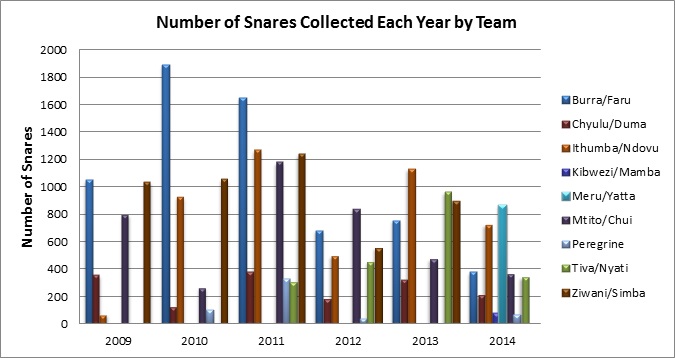‘Illegal hunting and the bush meat trade: an emerging crisis in African savannahs’
Presented by Peter Lindsey
Illegal hunting and the bush meat trade is a major crisis in Africa. Data has concluded that forest habitats are being affected by illegal hunting and trade. However, new information has also shown that savannahs and wildlife are being severely affected from illegal activities (Lindsey, et al., 2013).
The top 3 methods used to hunt animals are: snares, dogs, bows and arrows. Snares are a popular method, because they are cheap and hard to detect. However, snares are wasteful in terms of the large amount of animals that die. Snares are non-selective in the animals captured and cause a slow and painful death.

This graph shows the amount of snares used between 2009-2013 in various areas of Tsavo National Park (The David Sheldrick Wildlife Trust, not dated)
Illegal trade has both ecological and economic impacts. Below are examples of ecological and economic impacts:
Ecological Impacts:
- Edge Effects
- Wildlife Population Collapse
Economic Impacts:
- Low Tourism
- High Human Population Increases Illegal Trade
I have witnessed myself how good a source game ranches are in distributing meat. When I was in South Africa I went to an elephant kill. The elephant had been killed as a ‘trophy’, but the rehabilitation centre and the workers of the rehabilitation centre were able to buy the meat from the ranch. The amount of meat was massive and lasted for my stay and probably many months after I had left. The undesirable organs, such as the intestines were left for the animals in the reserve. Nothing was wasted, which was really important.
These pictures were taken and belong to Sarah Heritage (2010)
I’m sorry if these pictures are a bit gruesome, but this what is happening in Africa.
If populations were allowed to recover, than the bush meat trade could possibly work (Lindsey, et al., 2013). The increase commercialism and demand in bush meat, shows that urgent action needs to be taken to raise awareness to local people and governments. Failure to do this will result in severe decline of wildlife in savannahs. Along with ecological and economic and social impacts (Lindsey, et al., 2013).
In my opinion bush meat is generally important source of food in most cultures. However, it is now being abused and animals are being captured at high rates. I agree with Lindsey, et al, that if populations were allowed to recover, than this trade could work. Unfortunately, like most natural resources it is now being exploited, by people. I think that illegal hunting and the bush meat trade should have more severe penalties and that more awareness should be raised.
This topic reminded me of the cod problem and the results of overharvesting. The cod population has still been unable to recover and there is some speculation as to whether it will ever recover.
Maybe this is the future for the wildlife in the savannah??
Who knows??
Please join the ‘African Wildlife Conservation News’ on Facebook to keep up to date with news and information on projects
https://www.facebook.com/africanwildlifeconservationnews
Reference
Lindsey, P., Balme, G., Becher, M., Begg, C., Bento, C., Bocchino, C., Dickman, A., Diggle, R., Eves, H., Henschel, P., Lewis, D., Marnewick, K., Matthew, J., McNutt, W., McRobb, R., Midlane, N., Milanzi, J., Morley, R., Muphree, M., Opyene, V., Phadima, J., Purchase, G., Rentsch, D., Roche, C., Shaw, J., Westhuizen, H., Vilet, N., Zisadza-Gandiwa, P. (2013) The bush meat trade in African savannahs: impacts, drivers and possible solutions. Biological Conservations, 160, 80-96



I really enjoyed this talk, and it was refreshing to get another perspective on the bushmeat trade. I hate the idea of animals being hunted, but if it’s for consumption then I can make peace with that because I’ve learnt the local people in Africa have no other alternatives most the time. I’m not a vegetarian in the slightest, so I think I have no right to argue how wrong it is, but I believe animals can be killed ethically.
I agree populations of animals need to recover before they are harvested again, because it will just result in population declines of some of Africa’s animals.
I mentioned in my blog how if equally distributing the benefits of wildfire for the local people rather than banning bushmeat all together, then some common ground can be met. Peter also mentioned that if fish stock populations could be managed, then this may encourage people to hunt land animals less and stop those awful snares.
I don’t mind the gruesome pictures in your blog, as I didn’t mind them in Peter’s talk. But seeing the picture of the lioness caught in a snare in his talk was disheartening. You think of them as being powerful, top predators, but when faced with man, they’re left helpless.
Pingback: I made a comment on this blog | bsue45